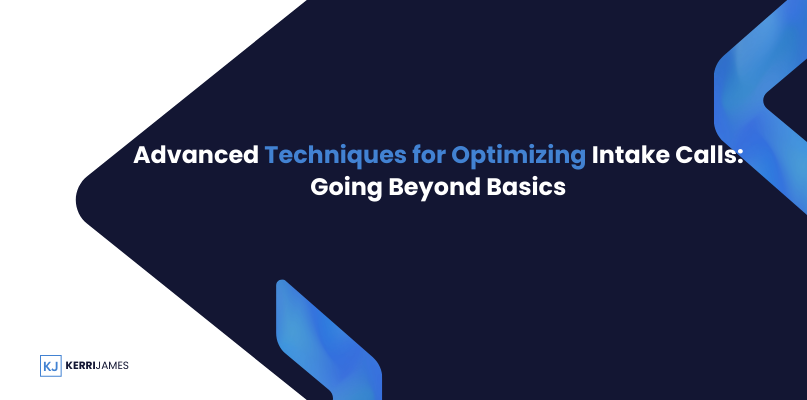In today’s fast-paced and highly competitive legal market, an effective intake process can significantly boost your law firm‘s success. The intake call often serves as the first direct interaction a potential client has with your firm. It’s more than just a fact-finding mission—it’s a vital opportunity to establish trust, demonstrate value, and secure new business. However, excelling at intake calls requires much more than simply answering questions and gathering details. Intake specialists need advanced communication techniques to connect with clients on a deeper level and close more deals.
The most successful law firms are those that train their intake teams in advanced psychological and emotional skills such as Neuro-linguistic programming (NLP), psychoanalysis, and emotional intelligence (EI). These tools equip intake specialists to handle complex conversations, uncover hidden client motivations, and guide them through the decision-making process. But the strategies don’t end there—by incorporating additional tools such as influence principles, objection handling methods, and technology, law firms can further optimize their intake process to convert more leads into paying clients.
This comprehensive guide will explore how law firms can train their intake teams in advanced communication strategies, while integrating technology and continuously developing emotional intelligence. By mastering these methods, your intake specialists can transform hesitant leads into loyal, long-term clients.
The Strategic Importance of Optimizing Intake Calls
The intake process plays a crucial role in converting potential clients into loyal advocates for your firm. A successful intake call does more than just capture information—it leaves the client feeling heard, understood, and confident that your firm is the right choice. Let’s break down the key reasons why it’s essential to optimize your firm’s intake process:
1. Building Lasting First Impressions
The old adage “you never get a second chance to make a first impression” rings particularly true in legal services. The intake call is often the first point of personal contact a client has with your firm, and the quality of that interaction can determine whether or not they hire you. A positive, empathetic, and professional intake call can lay the foundation for a successful client relationship, while a rushed or impersonal call may drive clients elsewhere.
Clients are often seeking legal help during some of the most stressful moments in their lives. Your intake team should recognize that first impressions matter, and they should aim to deliver a warm, empathetic, and solution-focused experience.
2. Trust as a Conversion Driver
Trust is the bedrock of any successful attorney-client relationship, and the intake call is a critical point for building that trust. Many clients will come to your firm with high levels of stress, anxiety, or uncertainty. Establishing trust early on can help them feel comfortable and confident in moving forward. Intake specialists who are able to quickly develop rapport and demonstrate empathy are far more likely to turn a lead into a loyal client.
3. Effective Information Gathering
The intake process isn’t just about making a good first impression; it’s also about gathering the information needed to determine whether the firm can assist the client. Intake specialists need to know how to ask the right questions and listen actively to fully understand the client’s legal situation. They must also be able to convey the firm’s value proposition, helping clients see the benefits of engaging your firm’s services.
4. Setting and Managing Expectations
Clients often come to law firms with preconceived notions about the legal process, timelines, and outcomes. Intake specialists play an important role in managing these expectations, explaining the legal process, potential timelines, and any next steps. Clear and honest communication during the intake call helps prevent misunderstandings down the road, reducing the likelihood of client dissatisfaction.
Neuro-linguistic Programming (NLP): A Deeper Level of Communication
Neuro-linguistic Programming (NLP) is a powerful communication model that focuses on understanding how people process information and how language influences thought and behavior. Intake specialists can leverage NLP techniques to build rapport quickly, guide client decision-making, and navigate difficult conversations.
1. Mirroring and Matching: Building Rapport Subconsciously
One of the most effective NLP techniques is mirroring and matching, which involves subtly reflecting the client’s tone, body language, and choice of words to create an unconscious connection. This makes clients feel more at ease and creates an immediate sense of familiarity.
How to Implement:
- Tone Matching: Match the client’s tone and pace of speech. If the client speaks softly and slowly, respond in a similar manner. If they are more direct and fast-paced, adjust your speaking style to mirror theirs.
- Language Mirroring: Reflect the language patterns your clients use. If they say, “I’m looking for a lawyer who understands my situation,” respond with similar phrasing like, “I understand what you’re looking for, and we have helped clients in situations just like yours.”
By mirroring and matching, intake specialists can build rapport quickly, making the client feel comfortable and understood.
2. Anchoring Positive Emotional States: Influence Through Emotion
Anchoring is another NLP technique where a specific word, phrase, or action is used to evoke a desired emotional response. Intake specialists can use anchoring to bring clients into a more positive emotional state—such as trust or optimism—throughout the call.
How to Implement:
- When a client expresses optimism or relief, use a reinforcing phrase such as, “I’m confident we can achieve the outcome you’re hoping for,” and repeat similar language at different points during the call to maintain the positive emotional state.
Anchoring allows intake specialists to guide the conversation in a way that makes the client feel more comfortable and optimistic about the legal process.
3. Reframing Objections: Turning Concerns into Positives
Reframing is an NLP technique used to change how clients perceive their objections. When a client raises a concern, such as the cost of services, an intake specialist can reframe the issue to focus on the value of long-term results or peace of mind.
How to Implement:
- If a client is concerned about the costs, the intake specialist might say, “I understand your concern about the cost, but think about the peace of mind you’ll have knowing your case is being handled by experts.”
Reframing objections helps intake specialists move clients past their initial hesitations, making them more likely to proceed with your firm.
Psychoanalysis: Uncovering and Addressing Deeper Client Motivations
Psychoanalysis provides valuable insights into the emotional and subconscious drivers behind a client’s decisions. By understanding these deeper motivations, intake specialists can tailor their approach to each client’s unique psychological needs.
1. Identifying Unconscious Fears: Listening Beyond Words
Often, potential clients bring unconscious fears and concerns to the table—whether it’s fear of the legal process, concern about being judged, or uncertainty about the outcome. Intake specialists need to listen for emotional cues, such as changes in tone or hesitation, to identify and address these fears.
How to Implement:
- Train intake specialists to ask open-ended questions like, “Can you tell me more about what concerns you most about this process?” Encourage them to listen for non-verbal cues or pauses that might indicate deeper anxieties.
2. Empathy as a Tool for Connection: Addressing Vulnerabilities
Clients may come to your firm in vulnerable, emotionally charged situations. Showing empathy by acknowledging their emotions helps intake specialists build trust and demonstrates that the firm genuinely cares about the client’s well-being.
How to Implement:
- Acknowledge emotions directly: “I can hear how stressful this situation has been for you. Our goal is to make this process as straightforward and supportive as possible.”
Empathy helps intake specialists move beyond transactional conversations and build stronger relationships that increase client loyalty.
3. Managing Transference and Countertransference
Transference occurs when a client projects feelings or attitudes from previous relationships or experiences onto the intake specialist. This could manifest as mistrust due to a negative experience with another lawyer. Intake specialists should recognize and manage these projections professionally.
How to Implement:
- If a client expresses skepticism or frustration, intake specialists can respond calmly and professionally: “I understand you’ve had concerns in the past. Let’s talk about how we can make this a more positive experience.”
Emotional Intelligence (EI): Navigating Complex Client Interactions
Emotional intelligence (EI) is the ability to recognize and manage one’s own emotions while also responding effectively to the emotions of others. Intake specialists with high EI can handle emotionally charged conversations, make clients feel understood, and build stronger client relationships.
1. Developing Emotional Self-Awareness: Managing Your Own Emotions
Before intake specialists can handle clients’ emotions effectively, they must first be aware of their own emotional states. Self-awareness is the foundation of emotional intelligence and helps specialists remain composed even during challenging conversations.
How to Implement:
- Incorporate mindfulness exercises into the workday. For example, have specialists take a few minutes before calls to practice deep breathing or grounding techniques.
- After each call, encourage specialists to reflect on their emotional reactions. Did they feel frustrated? Nervous? What triggered those feelings?
2. Empathy in Action: Creating Genuine Connections
Empathy goes beyond merely understanding a client’s situation—it involves putting yourself in the client’s shoes and responding in a way that makes them feel truly heard.
How to Implement:
- Use reflective listening. When a client expresses concern or stress, reflect their feelings back to them: “It sounds like you’ve been going through a tough time. We’re here to make sure you get the support you need.”
By practicing active empathy, intake specialists can connect with clients on an emotional level, which is critical for building trust and rapport.
3. Emotional Regulation Techniques: Handling Difficult Conversations
Intake specialists often deal with frustrated or emotional clients. High EI enables them to manage these conversations with grace, steering the dialogue back to a productive path without escalating tensions.
How to Implement:
- Teach emotional regulation techniques such as deep breathing, progressive muscle relaxation, or visualization exercises to help specialists stay calm and focused during difficult conversations.
The Psychology of Influence: Enhancing Persuasion in Intake Calls
The psychology of influence plays a significant role in client decision-making during intake calls. By understanding principles such as reciprocity, social proof, and scarcity, intake specialists can subtly guide clients toward a favorable decision without high-pressure tactics.
1. Reciprocity: Offering Value Before Asking for Commitment
Reciprocity refers to the psychological tendency for people to feel compelled to return a favor. Intake specialists can use this principle by providing helpful information or resources during the call, which encourages clients to engage further with your firm.
How to Implement:
- Offer valuable resources such as free consultations or downloadable legal guides during the call. For example, say, “I’d be happy to provide you with some useful resources that may help you understand your options.”
By offering something of value upfront, you create a sense of goodwill, making clients more likely to reciprocate by hiring your firm.
2. Social Proof: Leveraging Client Success Stories
Social proof is the idea that people make decisions based on what others have done in similar situations. Intake specialists can use social proof by referencing client testimonials, success stories, or positive reviews.
How to Implement:
- Mention client success stories that are relevant to the client’s situation: “We’ve helped many clients in similar situations, and they were extremely satisfied with the results.”
Providing examples of other clients who have benefited from your firm’s services helps reassure potential clients that they are making a good choice.
3. Scarcity: Creating Urgency Without Pressure
Scarcity is a psychological principle where people feel more motivated to act when they believe an opportunity is limited. Intake specialists can use scarcity to encourage clients to take action sooner rather than later.
How to Implement:
- Subtly emphasize the importance of acting quickly: “It’s crucial to take action soon so we can start gathering evidence and protect your rights.”
By framing the decision as time-sensitive, you encourage clients to move forward without making them feel rushed or pressured.
Overcoming Common Client Hesitations and Objections
Even with the best intake strategies, potential clients may still have hesitations or objections. A well-trained intake specialist needs to be equipped with the skills to address these concerns calmly and confidently, ensuring the client feels comfortable moving forward.
1. Handling Cost Concerns with Empathy and Transparency
Legal fees are often a major concern for clients. Intake specialists need to approach cost objections with empathy while explaining the value that your firm offers.
How to Implement:
- Acknowledge cost concerns openly: “I understand that legal fees can be a concern, but many of our clients find that resolving their issue promptly saves them time and money in the long run.”
- If your firm offers flexible payment plans or contingency fees, present these options to reassure clients that legal help is within their reach.
2. Addressing Trust Issues by Demonstrating Credibility
Some clients may be hesitant to trust your firm, particularly if they’ve had negative experiences with other law firms. Intake specialists should be prepared to address these trust issues by demonstrating transparency and credibility.
How to Implement:
- Offer testimonials or success stories from similar cases: “We’ve had great success with clients in situations like yours. Would it help if I shared a similar case and its outcome?”
- Provide clear, honest answers to client questions and address any concerns head-on.
3. Managing Emotional Resistance: Helping Clients Navigate Stress
Many clients experience emotional resistance, especially if their legal situation is tied to stress, anger, or fear. Intake specialists should be trained to recognize and navigate these emotions during the call.
How to Implement:
- Practice active listening and validate the client’s emotions: “I understand that you’re feeling overwhelmed right now, and that’s completely normal. Let’s talk through your options so you feel more confident about what to do next.”
By providing reassurance and emotional support, intake specialists can help clients move past their initial resistance and make a more informed decision.
Leveraging Technology to Streamline and Enhance the Intake Process
Incorporating technology into the intake process can significantly enhance both the client experience and the efficiency of your intake team. Tools such as Customer Relationship Management (CRM) systems, call recording, and automation can help streamline operations while providing a personalized experience for potential clients.
1. CRM Integration: Personalizing Client Interactions
A Customer Relationship Management (CRM) system tailored to legal intake allows your team to manage potential client information, track communications, and follow up on leads more effectively. CRMs provide valuable data on client interactions, enabling intake specialists to tailor their approach based on past conversations.
How to Implement:
- Train intake specialists on how to use CRM tools to record important client details, making follow-ups more personalized and relevant.
- Use automation features to send thank-you emails, appointment reminders, and follow-up communications.
2. Call Recording and Analysis: Continuous Improvement
Recording intake calls allows for in-depth analysis and ongoing training. Reviewing past calls helps identify common objections, communication patterns, and areas where the intake specialist could improve.
How to Implement:
- Regularly review intake calls as part of training. Highlight strengths and offer constructive feedback on how to handle specific client concerns more effectively.
- Use call analysis tools that offer speech recognition and emotion detection, providing insights into how clients are feeling and where the conversation might need adjustment.
3. Online Intake Forms and Chatbots: Capturing Leads 24/7
Many law firms are adopting online intake forms and chatbots to capture leads at any time, even outside of regular office hours. These tools can be integrated into your website and linked to your CRM, allowing potential clients to start the intake process when it’s convenient for them.
How to Implement:
- Ensure online forms are user-friendly and ask relevant questions that help qualify leads.
- Use chatbots to provide immediate assistance, schedule appointments, or answer common client questions.
Continuous Development of Emotional Intelligence for Lasting Success
While initial training in emotional intelligence is essential, maintaining high levels of EI requires continuous development. Emotional intelligence is not a fixed trait but a skill that can be honed over time with practice and reflection.
1. Developing Emotional Self-Awareness: Practicing Mindfulness
Intake specialists need to remain aware of their emotional states, particularly when dealing with difficult clients. Regular self-reflection and mindfulness practices can help intake specialists manage their emotions during challenging conversations.
How to Implement:
- Introduce short mindfulness exercises at the start of each shift to allow intake specialists to ground themselves before engaging with clients.
- Encourage intake specialists to keep a journal of emotionally challenging calls, reflecting on what triggered their emotional reactions and how they managed the situation.
2. Empathy-Building Exercises: Strengthening Emotional Connections
Building empathy is an ongoing process that requires active engagement with clients’ experiences. Regular empathy exercises can help intake specialists deepen their ability to connect with clients on an emotional level.
How to Implement:
- Use role-playing exercises that require intake specialists to respond to clients facing emotionally charged situations.
- Incorporate client testimonials or recordings into training sessions to help intake specialists better understand the client’s perspective and emotional journey.
3. Emotional Regulation Techniques: Staying Calm in Stressful Situations
Managing stress and emotional triggers is essential for intake specialists to remain calm and composed during intake calls. Providing them with tools for emotional regulation ensures they can handle even the most difficult clients with professionalism.
How to Implement:
- Teach techniques such as deep breathing, progressive muscle relaxation, or visualization to help intake specialists calm their nerves before or during stressful calls.
- Create a supportive environment where intake specialists can debrief after difficult calls, allowing them to express their emotions and receive feedback.
Measuring Success: Tracking Key Metrics to Optimize Intake Performance
To ensure your intake training program is delivering results, it’s essential to track key performance metrics that provide insight into how well your intake team is converting leads into clients. These metrics can help you identify areas for improvement and celebrate successes.
1. Conversion Rate: The Ultimate Measure of Success
The most important metric to track is the conversion rate—the percentage of potential clients who schedule a consultation or hire the firm after the intake call. This metric gives a clear indication of how effective your intake team’s communication techniques are.
How to Implement:
- Monitor conversion rates over time and compare them before and after implementing new training techniques.
- Identify intake specialists with higher conversion rates and have them share their best practices with the rest of the team.
2. Average Call Duration: Balancing Efficiency with Engagement
While intake calls shouldn’t be rushed, overly long calls can indicate inefficiency or difficulty in managing client concerns. Tracking average call durations can help identify where improvements in communication or process efficiency are needed.
How to Implement:
- Set benchmarks for ideal call length, allowing sufficient time for rapport building and information gathering without veering into unnecessary details.
- Analyze outliers—both very short and very long calls—to understand what contributed to those results and how they can be optimized.
3. Client Satisfaction: Gathering Feedback for Continuous Improvement
Client feedback provides valuable insights into how intake specialists are perceived by potential clients. Positive feedback can reinforce effective strategies, while negative feedback highlights areas for improvement.
How to Implement:
- Follow up with clients who went through the intake process but didn’t hire the firm to gather feedback on what could have been handled better.
- Use satisfaction surveys or reviews to gather data on how clients felt during the intake process, focusing on communication and empathy.
Final Words: Turning Your Intake Team into Client-Closing Experts
Training your intake team to close more clients requires more than just technical know-how. By incorporating techniques from Neuro-linguistic Programming, psychoanalysis, emotional intelligence, and other psychological principles, your team can develop the skills needed to truly connect with potential clients, understand their deeper motivations, and guide them toward making the right decision.
An optimized intake process not only improves conversion rates but also builds lasting relationships with clients who feel understood, valued, and confident in your firm’s ability to help them. As you continue to refine your intake training program, remember that success comes from ongoing development, practice, and a commitment to client-centered communication.
By mastering these advanced strategies, your law firm will be well-positioned to thrive in an increasingly competitive legal marketplace, turning more leads into satisfied clients and driving sustained business growth.










